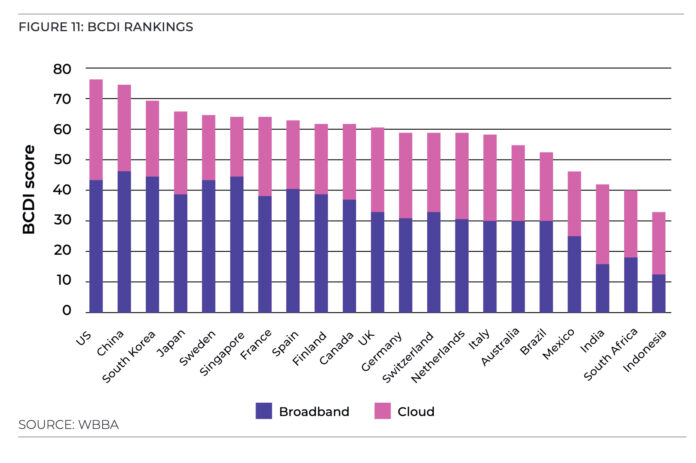Report predicts a 10% increase in fixed broadband penetration will increase GDP by 0.77% per capita
The World Broadband Association (WBBA) has published findings from its inaugural Broadband and Cloud Development Index (BCDI). It incorporates data on 21 countries across five continents, representing over half of the world’s population and over three-quarters of global GDP.
The report is designed to identify the best performing countries regarding cloud infrastructure and broadband provision to highlight the most critical drivers for the continued development of the sector and the investment case for broadband and cloud infrastructure.
Perhaps the most important prediction is that across all the countries, a 10% increase in fixed broadband penetration will lead to a 0.77% increase in GDP per capita. The report was launched at this week’s Broadband Development Congress at the Network X event in Paris.
The US tops the BCDI in both cloud and broadband, with China second overall. It is the only country to achieve a top ranking despite having a GDP per capita well below the index’s average. Germany is the notable laggard, ranking only fourteenth for broadband with 6% FTTH penetration, although its slightly better performance in cloud pulled it up two places to twelfth overall.
Do the arguments stack up?
It’s interesting to note that despite its relatively poor broadband infrastructure – which puts it on a par with South Africa and India – it is the world’s fourth largest economy with a GDP per capita of $46,846 (€44,272.9). Germany’s status as a digital infrastructure laggard is even clearer when looked at in a European-only context, such as by the FTTH Council Europe – see below (you can download its report from here).

Deutsche Telekom, which is Europe’s biggest operator group, is also the first European telco to reach €100 billion market capitalisation earlier this year, although its US subsidiary, T-Mobile is a major factor.
The WBBA study shows that other advanced European economies with below-average broadband penetration scores include Switzerland, the Netherlands and Italy.
Access is not enough
Dr Li Zhengmao, Chair of the Board, World Broadband Association, said, “Although broadband is increasingly seen as critical infrastructure alongside utilities such as electricity and water, the provision of broadband infrastructure is more complicated because access alone is not enough.”
This observation is supported by the FTTH Council Europe’s ground-breaking report, published earlier this year on barriers to FTTH adoption and this article on the under-consumption of fibre broadband in Europe and its impact on operators’ return on capital.
Li continued, “A more nuanced view needs to be developed to encourage stakeholders to support and invest in next generation broadband infrastructure to enable the digital applications and services vital to economic growth and social development. We hope that the findings of the BCDI and the key discussions from the BDC will help to galvanise all in the industry to overcome their differences and accelerate the roll out of critical broadband infrastructure.”
Future growth
Martin Creaner, Director General, WBBA, added, “Our report found that across all the countries, a 10% increase in fixed broadband penetration will lead to a 0.77% increase in GDP per capita.
“There is therefore a need for cloud providers and broadband providers to collaborate more at the industry level to support harmonisation of relevant standards and product certification, which the WBBA is working hard to facilitate. This will support the development of new converged broadband cloud infrastructure and business models, enabling the next phase of digital growth.”


